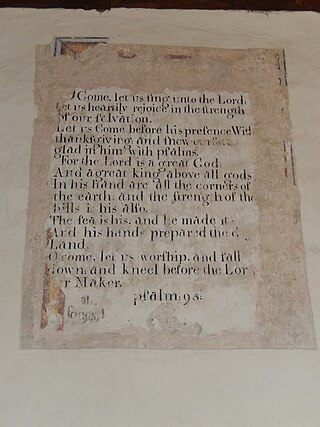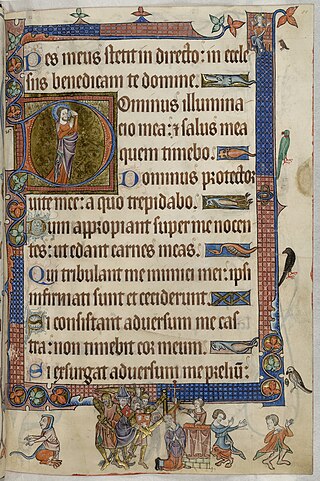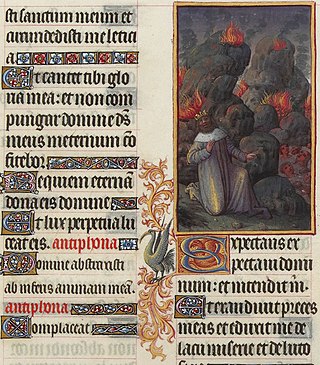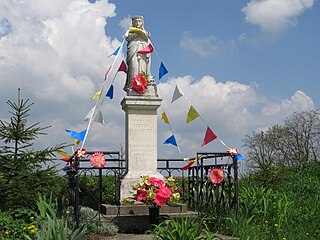
Psalm 95 is the 95th psalm of the Book of Psalms, beginning in English in the King James Version: "O come, let us sing unto the LORD: let us make a joyful noise to the rock of our salvation". The Book of Psalms starts the third section of the Hebrew Bible, and, as such, is a book of the Christian Old Testament. In the slightly different numbering system in the Greek Septuagint version of the Bible, and in the Latin Vulgate, this psalm is Psalm 94. In Latin, it is known as "Venite exultemus" or simply "Venite". The psalm is a hymn psalm, one of the Royal psalms, praising God as the King of His people. Psalm 95 identifies no author, but Hebrews 4:7 attributes it to David. The Vulgate also names David as the author.

Psalm 30 is the 30th psalm of the Book of Psalms, beginning in English in the King James Version: "I will extol thee, O LORD; for thou hast lifted me up". The Book of Psalms is part of the third section of the Hebrew Bible, and a book of the Christian Old Testament. In the slightly different numbering system used in the Greek Septuagint version of the Bible and in the Latin Vulgate, this psalm is Psalm 29. In Latin, it is known as "Exaltabo te Domine". It is a psalm of thanksgiving, traditionally ascribed to David upon the building of his own royal palace.

Psalm 147 is the 147th psalm of the Book of Psalms, beginning in English in the King James Version, "Praise ye the LORD: for it is good to sing praises". In the slightly different numbering system used in the Greek Septuagint version of the Bible, and in the Latin Vulgate/Vulgata Clementina, this psalm is divided into Psalm 146 and Psalm 147. In Latin, Psalm 146 is known as "Laudate Dominum quoniam bonum psalmus", and Psalm 147 as "Lauda Jerusalem Dominum".

Psalm 16 is the 16th psalm in the Book of Psalms, beginning in English in the King James Version: "Preserve me, O God: for in thee do I put my trust."

Psalm 27 is the 27th psalm of the Book of Psalms, beginning in English in the King James Version: "The LORD is my light and my salvation; whom shall I fear?". The Book of Psalms is part of the third section of the Hebrew Bible, and a book of the Christian Old Testament. In the slightly different numbering system used in the Greek Septuagint and Latin Vulgate translations of the Bible, this psalm is Psalm 26. In Latin, it is known as "Dominus illuminatio mea".
Psalm 28 is the 28th psalm of the Book of Psalms, beginning in English in the King James Version: "Unto thee will I cry, O LORD my rock;". The Book of Psalms is part of the third section of the Hebrew Bible, and a book of the Christian Old Testament. In the slightly different numbering system used in the Greek Septuagint and Latin Vulgate translations of the Bible, this psalm is Psalm 27. In Latin, it is known by the incipit, "Exaudi vocem deprecationis meae".

Psalm 33 is the 33rd psalm of the Book of Psalms, beginning in English in the King James Version: "Rejoice in the LORD, O ye righteous: for praise is comely for the upright". The Book of Psalms is part of the third section of the Hebrew Bible, and a book of the Christian Old Testament. In the slightly different numbering system used in the Greek Septuagint and Latin Vulgate translations of the Bible, this psalm is Psalm 32. In Latin, it is known by the incipit, "Exultate iusti in Domino". Its purpose is to praise "the Sovereignty of the Lord in Creation and History".

Psalm 40 is the 40th psalm of the Book of Psalms, beginning in English in the King James Version: "I waited patiently for the LORD". The Book of Psalms is part of the third section of the Hebrew Bible, and a book of the Christian Old Testament. In the slightly different numbering system used in the Greek Septuagint and Latin Vulgate translations of the Bible, this psalm is Psalm 39. In Latin, it is known by the incipit, "Expectans expectavi Dominum". It is described by the Jerusalem Bible as a "song of praise and prayer for help".

Psalm 136 is the 136th psalm of the Book of Psalms, beginning in English in the King James Version: "O give thanks unto the LORD; for he is good: for his mercy endureth for ever. ". The Book of Psalms is part of the third section of the Hebrew Bible, and a book of the Christian Old Testament. In the slightly different numbering system used in the Greek Septuagint and Latin Vulgate translations of the Bible, this psalm is Psalm 135. In Latin, it is known by the incipit, "Confitemini Domino quoniam bonus". It is sometimes referred to as "The Great Hallel". The Jerusalem Bible calls it a "Litany of Thanksgiving". It is notable for the refrain which forms the second half of each verse, translated as "For His mercy endures forever" in the New King James Version, or "for his steadfast love endures for ever" in the Revised Standard Version.

Psalm 135 is the 135th psalm from the Book of Psalms, a part of the Hebrew Bible and the Christian Old Testament, beginning in English in the King James Version: "Praise ye the LORD". In the slightly different numbering system of the Greek Septuagint and Latin Vulgate versions of the Bible, this psalm is Psalm 134. Its Latin title is "Laudate nomen Domini".

Psalm 132 is the 132nd psalm of the Book of Psalms, beginning in English in the King James Version: "LORD, remember David, and all his afflictions". In the slightly different numbering system used in the Greek Septuagint version of the bible and in the Latin Vulgate, this psalm is Psalm 130. In Latin, it is known as "Memento Domine David".

Psalm 123 is the 123rd psalm of the Book of Psalms, beginning in English in the King James Version: "Unto thee lift I up mine eyes, O thou that dwellest in the heavens". The Book of Psalms is part of the third section of the Hebrew Bible, and a book of the Christian Old Testament. This short psalm is one of fifteen psalms that begin with the words "A song of ascents". In Latin, it is known as "Ad te levavi oculos meos", and Baptist writer Charles Spurgeon calls it "the Psalm of the eyes".

Psalm 55 is the 55th psalm of the Book of Psalms, beginning in English in the King James Version, "Give ear to my prayer, O God, and hide not thyself from my supplication". The Book of Psalms forms part of the ketuvim, the third section of the Hebrew Bible, and is part of the Christian Old Testament. In the slightly different numbering system of the Greek Septuagint version of the Bible, and in the Latin Vulgate, this psalm is Psalm 54. In Latin, it is known as "Exaudi Deus orationem meam". The psalm is a lament in which the author grieves because he is surrounded by enemies, and one of his closest friends has betrayed him.

Psalm 66 is the 66th psalm of the Book of Psalms, beginning in English in the King James Version: "Make a joyful noise unto God, all ye lands". In the slightly different numbering system of the Greek Septuagint version of the Bible and the Latin Vulgate, this psalm is Psalm 65. In Latin, it is known as "Iubilate Deo omnis terra". It is a psalm of thanksgiving probably intended for use at the Passover. The psalm is divided into two parts: in verses 1-12 the community praises God and invites the whole world to join in praise; in verses 13–20, "an individual from the rescued community fulfils a vow to offer a sacrifice of thanksgiving".

Psalm 71 is the 71st psalm of the Book of Psalms, beginning in English in the King James Version: "In thee, O LORD, do I put my trust: let me never be put to confusion". It has no title in the Hebrew version. In the slightly different numbering system used in the Greek Septuagint and Latin Vulgate translations of the Bible, this psalm is Psalm 70. In Latin, it is known as "In te Domine speravi".

Psalm 79 is the 79th psalm of the Book of Psalms, beginning in English in the King James Version: "O God, the heathen are come into thine inheritance". In the slightly different numbering system used in the Greek Septuagint and Latin Vulgate translations of the Bible, this psalm is Psalm 78. In Latin, it is known as "Deus venerunt gentes in hereditatem tuam". It is one of the 12 Psalms of Asaph. The New American Bible calls it "a prayer for Jerusalem".

Psalm 81 is the 81st psalm of the Book of Psalms, beginning in English in the King James Version: "Sing aloud unto God our strength". In the slightly different numbering system used in the Greek Septuagint and Latin Vulgate translations of the Bible, this psalm is Psalm 80. In Latin, it is known as "Exultate deo adiutori nostro". It is one of the 12 Psalms of Asaph. Its themes relate to celebration and repentance. In the New King James Version its sub-title is "An Appeal for Israel's Repentance".

Psalm 115 is the 115th psalm of the Book of Psalms, beginning in English in the King James Version: "Not unto us, O LORD, not unto us, but unto thy name give glory". It is part of the Egyptian Hallel sequence in the fifth division of the Book of Psalms.

Psalm 113 is the 113th psalm of the Book of Psalms, beginning in English in the King James Version: "Praise ye the Lord, O ye servants of the Lord". The Book of Psalms is part of the third section of the Hebrew Bible, and a book of the Christian Old Testament. In Latin, it is known as 'Laudate pueri Dominum.

Psalm 118 is the 118th psalm of the Book of Psalms, beginning in the English of the King James Version: "O give thanks unto the LORD; for he is good: because his mercy endureth for ever." The Book of Psalms is part of the third section of the Hebrew Bible, and a book of the Christian Old Testament. In the slightly different numbering system used in the Greek Septuagint and Latin Vulgate translations of the Bible, this psalm is Psalm 117. In Latin, it is known as "Confitemini Domino quoniam bonus quoniam in saeculum misericordia eius". Its themes are thanksgiving to God and reliance on God rather than on human strength.





















